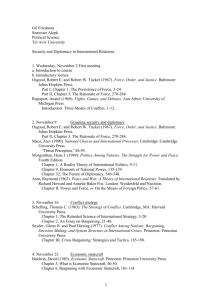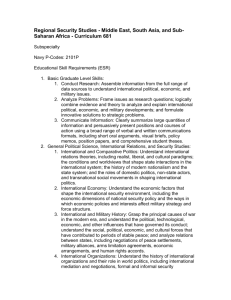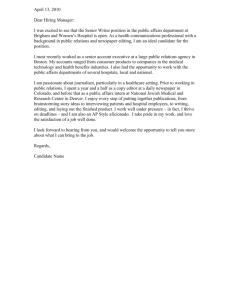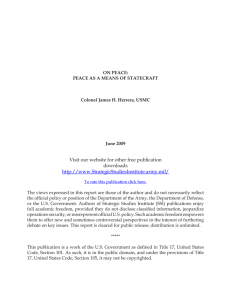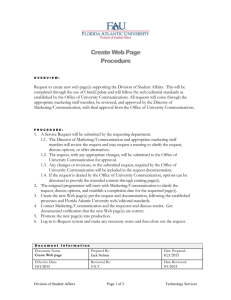The Art and Science of Statecraft
advertisement
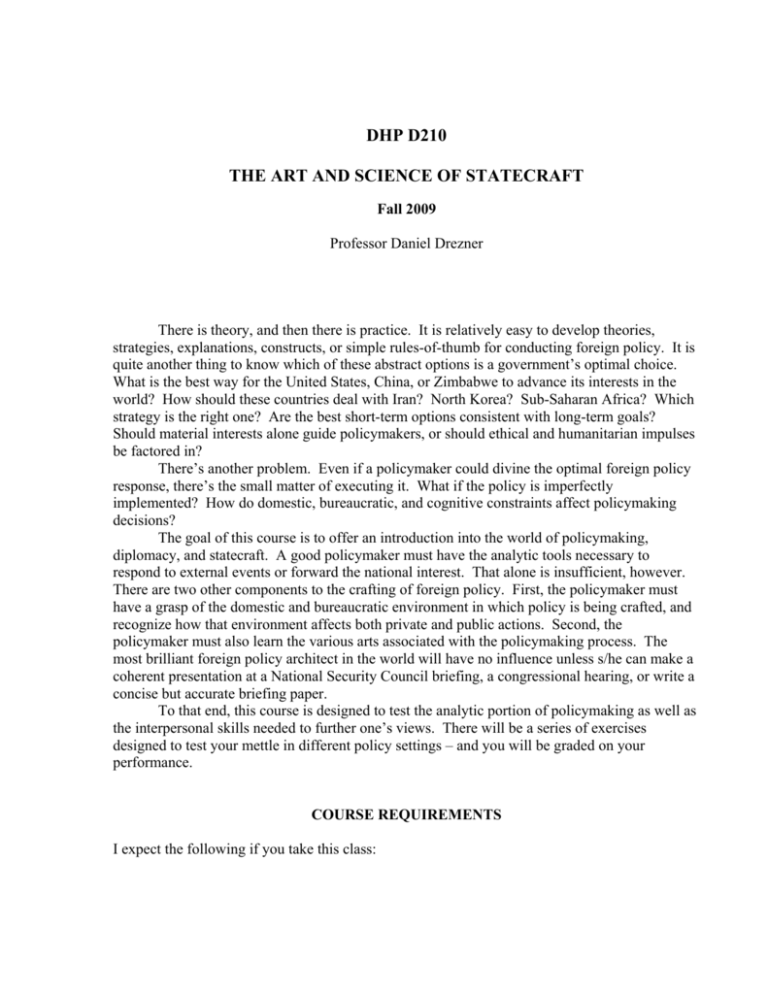
DHP D210 THE ART AND SCIENCE OF STATECRAFT Fall 2009 Professor Daniel Drezner There is theory, and then there is practice. It is relatively easy to develop theories, strategies, explanations, constructs, or simple rules-of-thumb for conducting foreign policy. It is quite another thing to know which of these abstract options is a government’s optimal choice. What is the best way for the United States, China, or Zimbabwe to advance its interests in the world? How should these countries deal with Iran? North Korea? Sub-Saharan Africa? Which strategy is the right one? Are the best short-term options consistent with long-term goals? Should material interests alone guide policymakers, or should ethical and humanitarian impulses be factored in? There’s another problem. Even if a policymaker could divine the optimal foreign policy response, there’s the small matter of executing it. What if the policy is imperfectly implemented? How do domestic, bureaucratic, and cognitive constraints affect policymaking decisions? The goal of this course is to offer an introduction into the world of policymaking, diplomacy, and statecraft. A good policymaker must have the analytic tools necessary to respond to external events or forward the national interest. That alone is insufficient, however. There are two other components to the crafting of foreign policy. First, the policymaker must have a grasp of the domestic and bureaucratic environment in which policy is being crafted, and recognize how that environment affects both private and public actions. Second, the policymaker must also learn the various arts associated with the policymaking process. The most brilliant foreign policy architect in the world will have no influence unless s/he can make a coherent presentation at a National Security Council briefing, a congressional hearing, or write a concise but accurate briefing paper. To that end, this course is designed to test the analytic portion of policymaking as well as the interpersonal skills needed to further one’s views. There will be a series of exercises designed to test your mettle in different policy settings – and you will be graded on your performance. COURSE REQUIREMENTS I expect the following if you take this class: 2 You will keep abreast of current events in American foreign policy. This includes reading a daily newspaper or three (the New York Times, Washington Post, Christian Science Monitor, Financial Times, Wall Street Journal, etc.) plus the Economist. In class, you will turn off or mute your cell phone – and any other electronic device that makes noise. If your phone rings in class, I will make you sing a song of my choosing – and bear in mind I have a soft spot for maudlin ballads. I expect your full participation. This means you should have read the assigned material before the class date. I place a high degree of importance on class participation. This does not mean talking for talking's sake, it means making incisive observations that display original thinking. Oh, and I will call on you on occasion, just to be mean. Your grade will be based on the following: A grand strategy paper. You will be asked to prepare a national security strategy for a country of your choosing. This strategy paper should detail the strategic environment for your country, what its goals should be, and what resources, strategies, and tactics will be brought to bear in order to achieve desired ends. This will count for 30% of your grade An op-ed on an issue of your choosing. This exercise will count for 15% of your grade. A final paper. You will prepare a policy options memorandum outlining a menu of possible options to deal with a problem of my choosing. The memo should delineate all of the feasible options, assess their likelihood of success, and offer a clear set of actionable recommendations. Your analysis will be based on information you have gleaned from the class, as well as additional research on your own on the country or issue in question. This will count for 30% of your grade. Class participation. This will count for 25% of your grade. REQUIRED TEXTBOOKS Daniel W. Drezner, ed. Avoiding Trivia: The Role of Strategic Planning in American Foreign Policy. (Washington: Brookings Institution Press, 2009). Leslie H. Gelb. Power Rules: How Common Sense Can Rescue American Foreign Policy (New York: Harper Collins, 2009). Alexander George, Bridging the Gap: Theory & Practice in Foreign Policy (Washington: United States Institute of Peace Press, 1993). Dennis Ross, Statecraft (Farrar, Strauss & Giroux, 2007). 3 PART I: Introduction 1) You, me, and everyone we know (9/9) 2) Political science and foreign policy (9/14) George, Bridging the Gap, pp. 1-31. Ross, Statecraft, preface and chapter one. Philip Zelikow, “Foreign Policy Engineering: From Theory to Practice and Back Again,” International Security 18 (Spring 1994): 143-171. Stephen M. Walt, “The Relationship between Theory and Policy in International Relations.” Annual Review of Political Science 8 (2005): 23-48. 3) Strategy and statecraft (9/16) Drezner, Avoiding Trivia, chapters 1, 3-4 and 9. Gelb, Power Rules, chapter 5. George W. Bush, second inaugural address, January 20, 2005. Accessible at http://www.whitehouse.gov/news/releases/2005/01/20050120-1.html. 4) A Power Audit (9/21-9/23) Gelb, Power Rules, chapter 4. G. John Ikenberry, Michael Mastanduno, and William Wohlforth, “Unipolarity, State Behavior, and Systemic Consequences,” World Politics 61 (January 2009): 1-27. Parag Khanna, “Waving Goodbye to Hegemony,” New York Times Magazine, January 27, 2008. Christopher Layne, “The Waning of U.S. Hegemony—Myth or Reality? A Review Essay,” International Security 34 (Summer 2009): 147-172. Josef Joffe, “The Default Power,” Foreign Affairs 88 (September/October 2009): 21-35. APSA Task Force report on standing 4 Mathew J. Burrows and Jennifer Harris, “Revisiting the Future: Geopolitical Effects of the Financial Crisis,” The Washington Quarterly 32 (April 2009): 27-38. PART II: The Modes of Statecraft 1) Deterrence, honesty and reputation (9/28) Anne Sartori, “The Might of the Pen: A Reputational Theory of Communication in International Disputes.” International Organization 56 (February 2002): 121-149. George Downs and Michael Jones, “Reputation, Compliance and International Law,” Journal of Legal Studies 31 (January 2002): S95–S114. Daryl Press, “The Credibility of Power: Assessing Threats during the ‘Appeasement’ Crises of the 1930s,” International Security 29 (Winter 2004/05): 136-169. 2) Alignment, balancing, bandwagoning, and ‘soft balancing’ (9/30) Steven David, “Explaining Third World Alignment,” World Politics 43 (January 1991): 233256. Randall L. Schweller, “Bandwagoning for Profit: Bringing the Revisionist State Back In,” International Security 19 (Summer 1994): 72-107. Robert Pape, “Soft Balancing against the United States,” International Security 30 (Summer 2005): 7-45. Stephen Brooks and William Wohlforth, “Hard Times for Soft Balancing,” International Security 30 (Summer 2005): 72-108. Navin Bapat et al, “Perfect Allies? The Case of Iraq and Al Qaeda,” International Studies Perspectives 8 (August 2007), 272-286. OCTOBER 5th: NO CLASS 3) Does regime type matter? Is regime change possible? (10/7) Larry Diamond, “Universal Democracy?” Policy Review 119 (June/July 2003). Andrew Natsios, “Democratic Opportunity in the Arab and Muslim World,” Cambridge Review of International Affairs 19 (June 2006): 263-270. 5 Jeffrey Kopstein and David Reilly, “Geographic Diffusion and the Transformation of the Postcommunist World,” World Politics 53 (October 2000): 1-37. Thomas Carothers, “How Democracies Emerge: The ‘Sequencing’ Fallacy,” Journal of Democracy 18 (January 2007): 11-27. 4) Multilateralism, minilateralism, bilateralism, and unilateralism (10/14-10/19) Stephen Brooks and William Wohlforth, “International Relations Theory and the Case Against Unilateralism,” Perspectives on Politics 3 (September 2005): 509-524. Ivo Daalder and James Lindsey, “Democracies of the World, Unite!” The American Interest 2 (January/February 2007): Naazneen Barma, Ely Ratner and Steven Weber, “A World Without The West,” The National Interest 90 (July/August 2007): 23-31. Moises Naim, “Minilateralism” in Foreign Policy. Stuff from Global Governance 5) Diplomacy, legitimacy and communication (10/21) Thomas Risse, “Let’s Argue! Communicative Action in World Politics,” International Organization 54 (Winter 2000): 1-39. Henry Farrell, “Constructing the International Foundations of E-Commerce—The EU-U.S. Safe Harbor Arrangement,” International Organization 57 (April 2003): 277-306. Ross, Statecraft, chapter eight. 6) Private diplomacy (10/26) Bruce Jentleson and Christopher Whytock, “Who ‘Won’ Libya?” International Security 30 (Winter 2005/06): 47-86. Peter Neumann, “Negotiating With Terrorists,” Foreign Affairs 86 (January/February 2007): 128-138. Anthony Wanis-St. John, “Back-Channel Negotiation: International Bargaining in the Shadows.” Negotiation Journal (April 2006): 119-144. Dean G. Pruitt, “Back-Channel Communication in the Settlement of Conflict.” International Negotiation 13 (Winter 2008): 37-54. 6 Case study: The Israel-Palestinian conflict (10/28) Ross, Statecraft, chapter twelve Gelb, Power Rules, chapter 12. 7) Public diplomacy (11/2) Christopher Ross, “Public Diplomacy Comes of Age,” The Washington Quarterly 25 (Spring 2002): 75-83. Benjamin Goldsmith and Yusaku Horiuchi, “Spinning the Globe? U.S. Public Diplomacy and Foreign Public Opinion.” American Journal of Political Science 71 (July): 863-875. Jozef Bátora, “Public Diplomacy in Small and Medium-Sized States.” Netherlands Institute for International Relations. Accessed at http://www.clingendael.nl/publications/2005/20050300_cli_paper_dip_issue97.pdf. 11/5, 2:00 PM: OP-ED SUBMISSION DUE PLEASE HAND INTO KAREN MOULLING (Cabot 411) PART III: The tools of Statecraft 1) Agenda-setting (11/4) Gelb, Power Rules, chapter 10. 2) Military statecraft (11/9-11/11) Gelb, Power Rules, chapter 8. Robert Pape, “Coercion and Military Strategy: Why Denial Works and Punishment Doesn’t,” Journal of Strategic Studies 15 (December 1992). George, Bridging the Gap, chapters 71-88. Dani Reiter, “Exploring the Bargaining Model of War,” Perspectives on Politics 1 (March 2003): 27-43. 7 Andrew Stigler, “A Clear Victory for Air Power: NATO’s Empty Threat to Invade Kosovo.” International Security 27 (Winter 2002/03): 124-157. Virginia Page Fortna, “Does Peacekeeping Keep Peace? International Intervention and the Duration of Peace After Civil War,” International Studies Quarterly 48 (June 2004): 269-292. 2) Economic statecraft (11/16-11/18) Arne Tostenson and Beate Bull, “Are Smart Sanctions Feasible?” World Politics 54 (April 2002): 373-403. Rachel Loeffler, “Bank Shots: How the Financial System Can Isolate Regimes,” Foreign Affairs 88 (March/April 2009): 101-110. Daniel W. Drezner, “The Hidden Hand of Economic Coercion.” International Organization 57 (Summer 2003): 643-659. Peter Andreas, “Criminalizing Consequences of Sanctions: Embargo Busting and Its Legacy,” International Studies Quarterly 49 (June 2005): 335-360. David Cortright and George Lopez, “Containing Iraq: Sanctions Worked,” Foreign Affairs 83 (July/August 2004): 90-103. Daniel W. Drezner, “Bad Debts: Assessing China's Financial Influence in Great Power Politics.” International Security 34 (Fall 2009): 1-35. 11/20, 2:00 PM: GRAND STRATEGY DOCUMENT DUE PLEASE HAND INTO KAREN MOULLING (Cabot 411) 3) Inducements (11/23-11/25) Gelb, Power Rules, chapter nine. George, Bridging the Gap, 61-70. Daniel W. Drezner, “The Trouble with Carrots: Transaction Costs, Conflict Expectations, and Economic Inducements.” Security Studies 9 (Autumn 1999/Winter 2000): 188-218. Miroslav Nincic, “The Logic of Positive Engagement: Dealing with Renegade Regimes,” International Studies Perspectives 4 (November 2006): 321-341. Ruth Grant, “Ethics and Incentives: A Political Approach,” American Political Science Review 100 (February 2006): 29-39. 8 Deepak Malhotra, “Without Conditions,” Foreign Affairs 88 (September/October 2009): 84-91. 4) What the f#$% is “soft power” anyway? (11/30) Suzanne Nossel, “Smart Power,” Foreign Affairs 83 (March/April 2004): 131-142. Benjamin Fordham and Victor Asal, “Billiard Balls or Snowflakes? Major Power Prestige and the International Diffusion of Institutions and Practices,” International Studies Quarterly 51 (March 2007): 31–52. Josh Busby, “Bono Made Jesse Helms Cry: Jubilee 2000, Debt Relief, and Moral Action in International Politics,” International Studies Quarterly 51 (June 2007): 247-508. Monti Narayan Datta, “The Decline of America’s Soft Power in the United Nations.” International Studies Perspectives 10 (Spring): 265-284. PART IV: Grand strategy, revisited 1) Evaluating the Obama administration (12/2) Barack Obama, “Renewing American Leadership,” Foreign Affairs 86 (July/August 2007): 2-16. Barack Obama, “Remarks by the President on a New Beginning,” Cairo, Egypt, June 4, 2009. Accessed at http://www.whitehouse.gov/the_press_office/Remarks-by-thePresident-at-Cairo-University-6-04-09/. Hillary Clinton, “Foreign Policy Address at the Council on Foreign Relations,” New York, NY, July 15, 2009. Accessed at http://www.state.gov/secretary/rm/2009a/july/126071.htm. Roger Cohen, “The Making of an Iran Policy,” New York Times Magazine, August 2, 2009. Accessed at http://www.nytimes.com/2009/08/02/magazine/02Irant.html?_r=1&pagewanted=print. 2) A pressing policy issue: global warming (12/7) Michael A. Levi, “Cophenhagen’s Inconvenient Truths,” Foreign Affairs 88 (September/October 2009): 92-104. Jessica Seldon Wallack and Veerabhadran Ramanathan, “The Other Climate Changers,” Foreign Affairs 88 (September/October 2009): 105-113. 9 Joel Kurtzman, “The Low-Carbon Diet,” Foreign Affairs 88 (September/October 2009): 114-123. 3) Policy simulation our very own Copenhagen (12/9) 12/14, 2:00 PM: POLICY OPTIONS PAPER DUE PLEASE HAND INTO KAREN MOULLING (Cabot 411)
